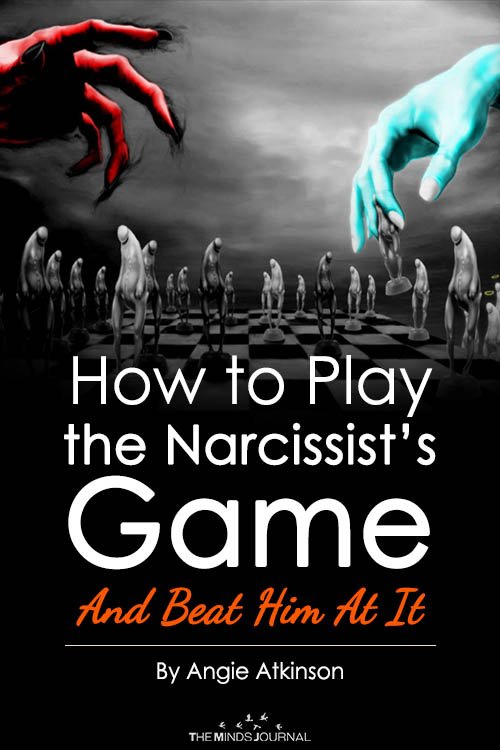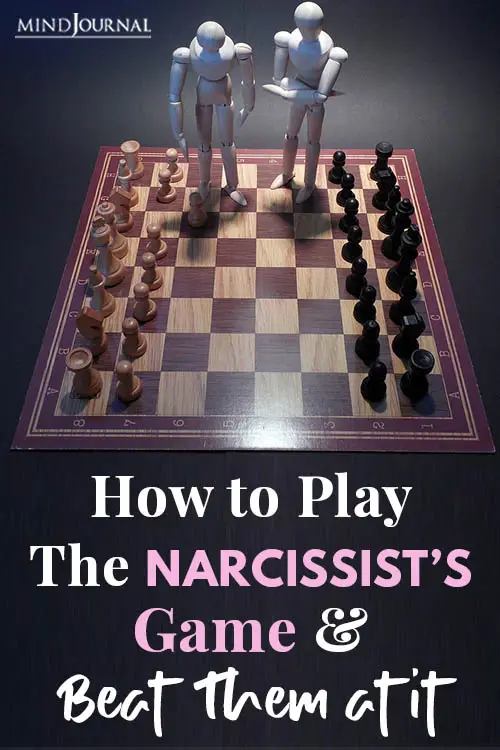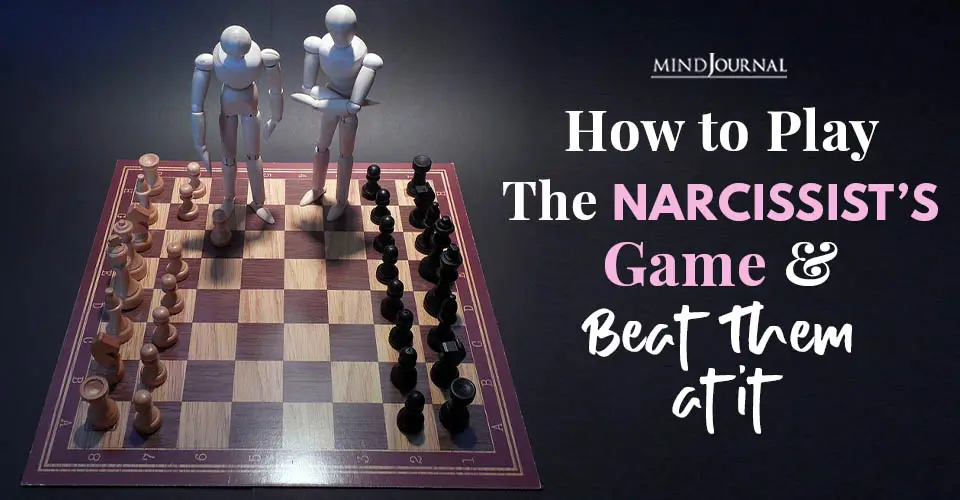Are you a victim of narcissistic behavior? You can turn the table and beat them at their own game. Read on to know how!
“I stood up as best I could to their disgusting stupidity and brutality, but I did not, of course, manage to beat them at their own game. It was a fight to the bitter end, one in which I was not defending ideals or beliefs but simply my own self.”
– George Grosz
So, you are involved in a relationship with a narcissist, and life is kind of difficult, to say the least. Or you’re just dealing with a very difficult person, or maybe someone who just seems really toxic.
Are you tired of the insults, the mean looks, and the general gaslighting? Is someone’s toxic or narcissistic behavior giving you a really good reason to finally say you’ve had enough?
You Can Outplay the Narcissist
You want to beat the narcissist, right? Believe me, I get it. In fact, that’s part of why I have covered how to deal with a narcissist in detail, as well as how to deal with other types of difficult and toxic people, including psychopaths and sociopaths, as well as anyone on the cluster b spectrum.
In each case, the ideal answer is nearly always to leave and go no contact, post-haste.
And before we get into how to outplay the narcissist, I have good news and bad news for you. The good news is that you absolutely CAN beat the narcissist, but good. The bad news?
Narcissists Do Not Change
The fact is that narcissists and most others who have cluster b personality B personality disorders are well-known to be incredibly difficult to deal with, and while it is theoretically possible that they might change for the better, it rarely happens, if ever.
In fact, I’ve never heard of or spoken to anyone who has seen a narcissist change successfully.
So, expecting a narcissist to change for love will leave you sadly disappointed and wasting a lot of your life hoping for something that is statistically impossible. And yet, it isn’t always possible to leave a narcissist – at least not immediately.
No Contact Isn’t Always an Option
This is evidenced by the fact that some of the most frequently asked questions on narcissistic abuse recovery that I hear from survivors include things like:
- How do I deal with the narcissist if I can’t leave?
- What can I do to make life easier while I’m working on leaving the narcissist?
- What if I can’t go no-contact with the narcissist?
- How do I beat the narcissist at their own game?
Maybe they can’t go no contact because they have kids with the narcissist and need to co-parent, or maybe it’s because the narcissist in their life is their boss and they really need their job.
Or maybe it’s because the narcissist lives next door, and they don’t want to sell their home. Or the narcissist is an extended family member or friend who going no contact with might cause you to lose the other people in the group that connects you.
In any case, you might find yourself trying to figure out what it takes to beat a narcissist – and in that case, stick with me, because I’m going to tell you exactly what you need to do if you want to beat the narcissist.
Related: The Narcissistic Lover’s Playbook: Stages of Relationship With a Narcissist
How to Beat the Narcissist At Their Own Game
Do you want to learn how to play the narcissist’s game so that you can beat them at it? We’ll get to that…but before we do, let me ask you something.
Would you agree that narcissist cares just as much about how they’re perceived as they do about how YOU behave inside your relationship? Is he or she always the one who calls the shots – whether directly or indirectly?
When I say directly, I mean by literally setting the rules; or indirectly, by manipulating every situation to his or her advantage. So, inside the relationship, the narcissist is controlling, often of every single aspect, to say the very least.
Would you agree that it’s always ABOUT the NARCISSIST?
Assuming you would let me ask you another question: would you agree that people who don’t know the narcissist as well as you do may see him or her as a very generous, selfless, or fun-to-be-around type of person?
That’s what you call the narcissistic conundrum – sort of their secret sauce – the “duel personality” thing.
They’re one person at home (or in private) and another person in public or around “outsiders.” They are the type who’s nicer to strangers than they are to the people they love.
(But as one of the narcissist’s favorite forms of narcissistic supply, you already know that their “generosity” is always equipped with proper strings.)
Oh, and then there’s the fact that you can’t always count on a narcissist to explode when something’s wrong in their little world – you’ll also have the covert narcissist types who will often just shut down and force you to figure out what you did wrong this time.
And this one may not speak to you for days or weeks, even.
Playing the Game: The Rules of Toxic Narcissism
1. The apparent objective of the game is self-preservation – but there’s a twist! (Isn’t there always?)
2. The twist is that you’ve got to discover the tipping point between self-preservation and self-destruction when it comes to this game.
3. If you focus too much on self-preservation, you may find yourself exhibiting certain classic narcissistic behaviors. But if you focus too little on it, you find yourself being a typical “narcissistic abuse victim.” (See how I didn’t say “SURVIVOR” there?)
4. During the course of a relationship with a narcissist, especially a toxic one, you’re going to find yourself sliding back and forth on a sort of track between the two extremes.
So, the actual objective of the game is to simply keep spinning, stay on that sliding track, and be inside the narcissist’s so-called harem. To just simply KEEP THE GAME GOING.
Another super-fun fact about narcissists?
They like to play both sides; that is, one day, they might play a victim who needs rescuing (damsel in distress, anyone?) while the next day, they’ll find center stage by becoming someone’s savior.
Related: 4 Key Behaviors A Narcissist Displays That Reveals Their True Colors
The Players in the Narcissist’s Game
Your role as a player in the narcissistic game is fluid – sometimes, you’ll be the victim who needs to be rescued. And when the narcissist wants to be rescued? You’ll be the hero.
Either way, don’t try to steal the narcissist’s spotlight. They won’t like that one bit. But then again, sometimes, the narcissist will need to crush someone’s soul – and guess what friend?
That’d be your role, too – the crushee, of course. That’s because you’re at least part of the little “harem” of people that feeds them a narcissistic supply.
FYI: Narcissistic supply is usually a person, but can also be a pet or group of people, the narcissistic supply is used by the narcissist to get attention, validation, admiration – all the “supply” they need to feed their ego.
The narcissist often has a circle of supply or “narcissistic harem.”
The Rule That Overpowers All Rules
No matter what, you must keep the game going. It’s absolutely necessary for both parties to participate if one of you (the narcissist) is going to win in the end.
Oh yes, that’s the last rule: you WILL NOT win. You can’t, because even if by all logical standards and opinions, you are the clear-cut winner, the narcissist will never, ever acknowledge, admit or encourage you to discuss it.
He will instead find literally any reason to place the fault on someone else and artificially elevate his own fragile ego.
So, in short:
- The object of the game is to keep the game going.
- The biggest rule of the game is that both parties must participate in the game.
- The other rule of note is that you cannot win the game.
Okay, so let me ask you: why are you playing this game again?
Related: 5 Effective Ways To Deal With The Narcissist In Your Life
How to Beat the Narcissist: Winning Their Game
Here is how you win that game – the ONLY move that will save you: you get the hell out of it. You leave, you quit, you end it. GAME OVER.
That is how you beat the narcissist at his game. You leave.
That’s it.
Of course, if you can’t leave the narcissist, you can try these strategies.
And this video will offer you more actionable strategies on how to play the game and beat them at it.
narcissist’s game and beat them at it. game and beat them at it.
Written by Angie Atkinson Originally appeared on Queenbeing.com
So, that was it on narcissistic behavior traits and how you can use them against a narcissist. Can you mention an example of narcissistic behavior that you faced? Leave a comment down below!











Response
I am so happy these post assist. I would be totally lost without them. I am married to a narcissistic who fools everyone around us, including my family. He hates ny kids to be around and inspire of his kids cursing us every chance they get or going to fb to wish our daughter die. And when our daughter died they laughed and said they only came to the funeral to watch me cry. He stil put them on a pedestal. But try n get me to tirn against my kids, who has been nothing but respectful and everyday. He always tell me every hates me and tell him they don’t want me around. Because of u guys I figured out he’s a narcissistic and how to ignore him to the fullest. Thank you.